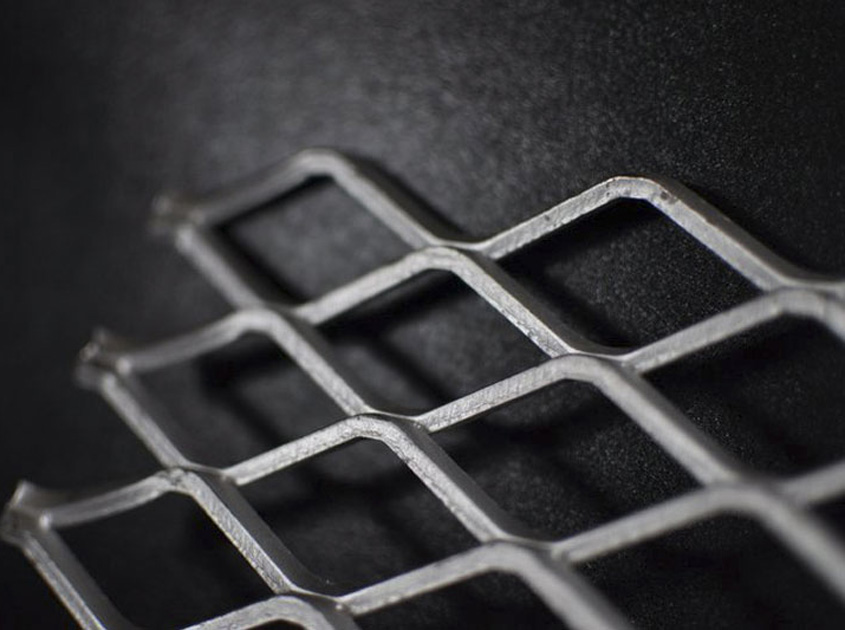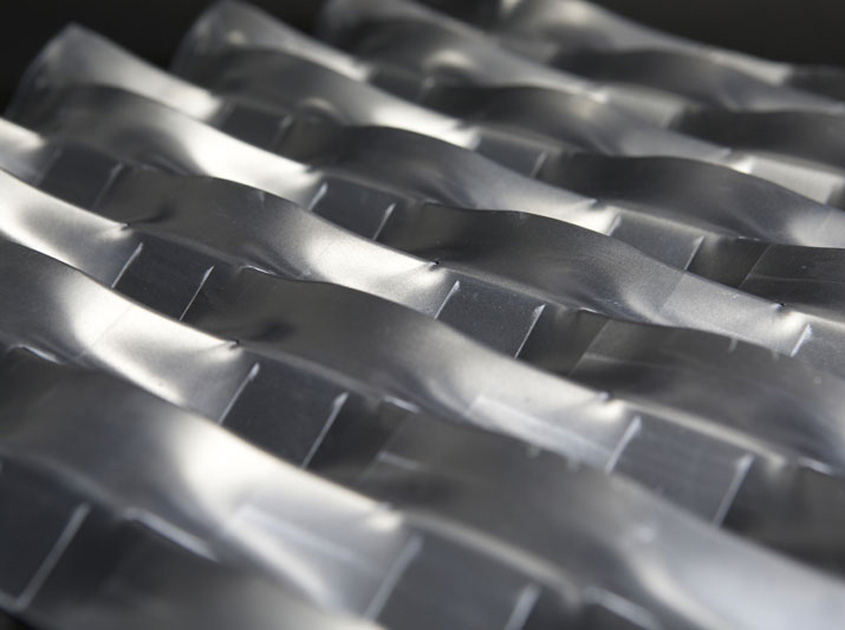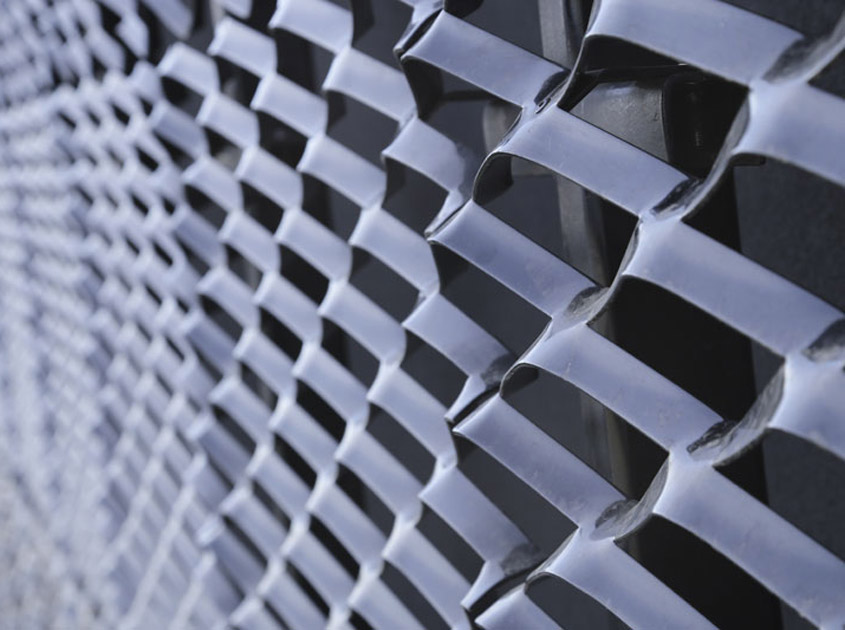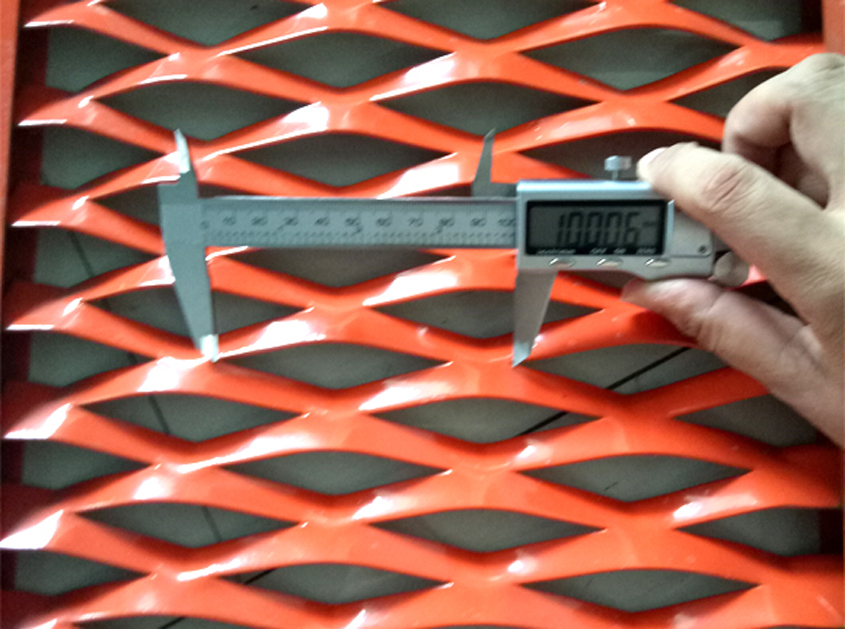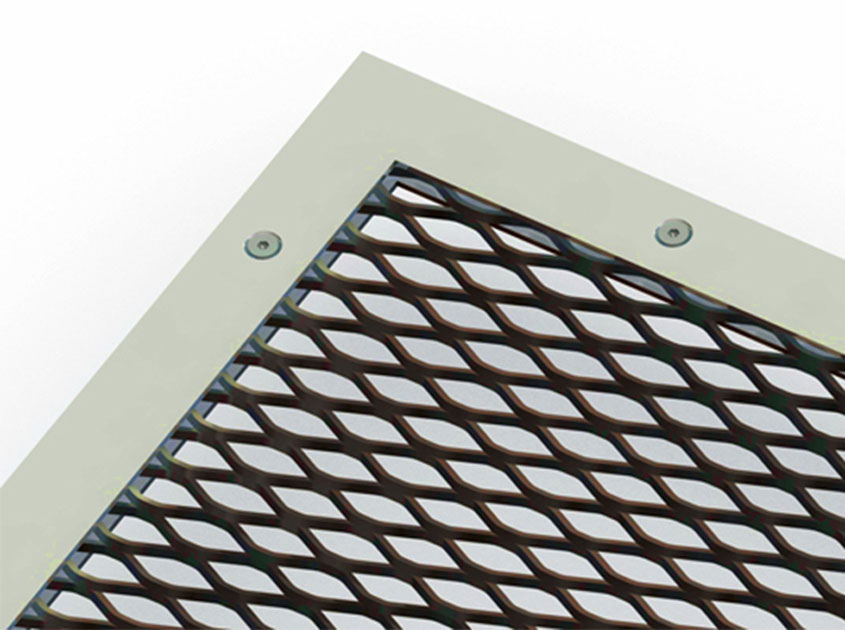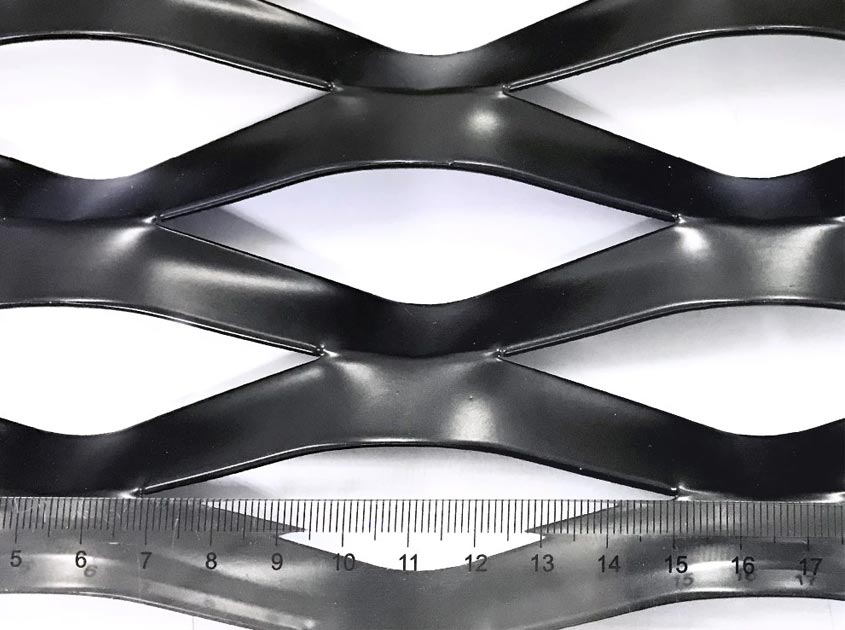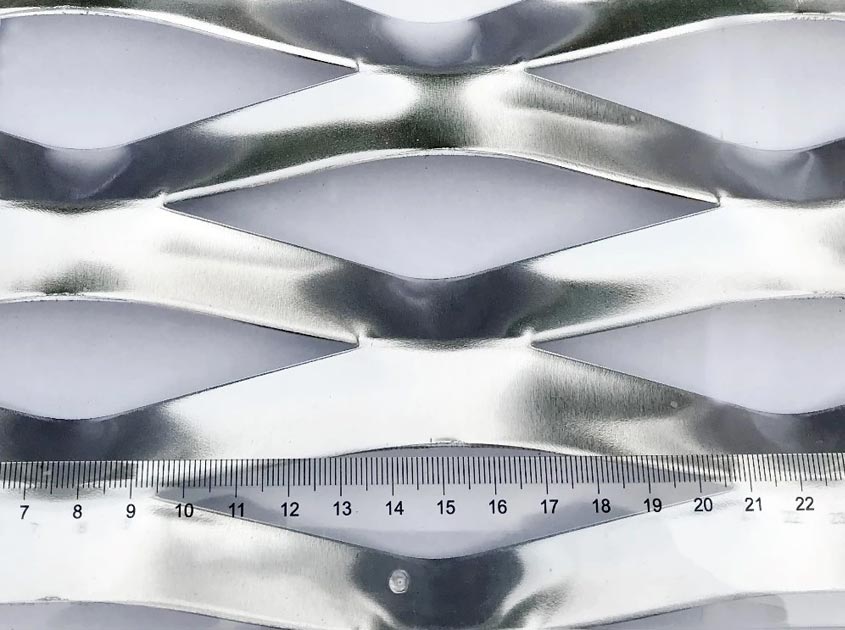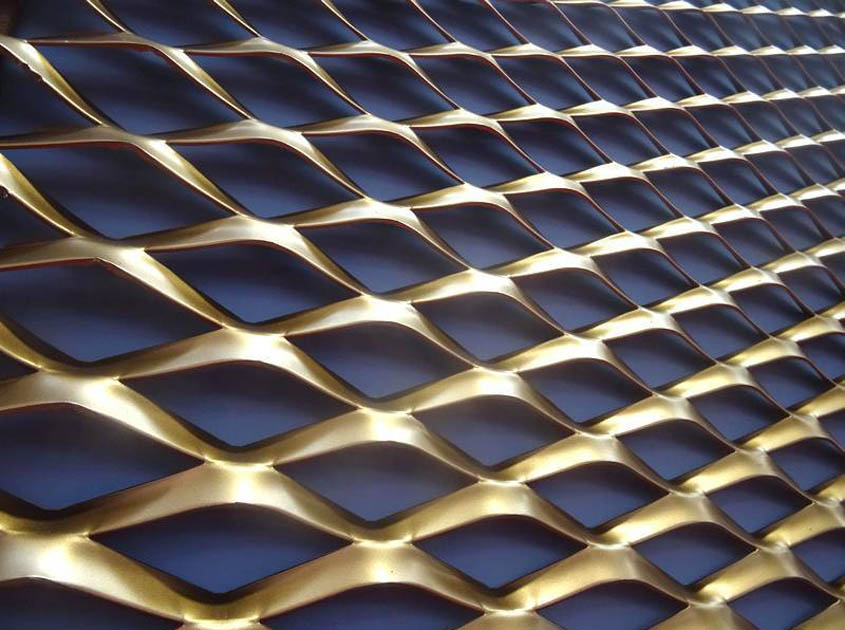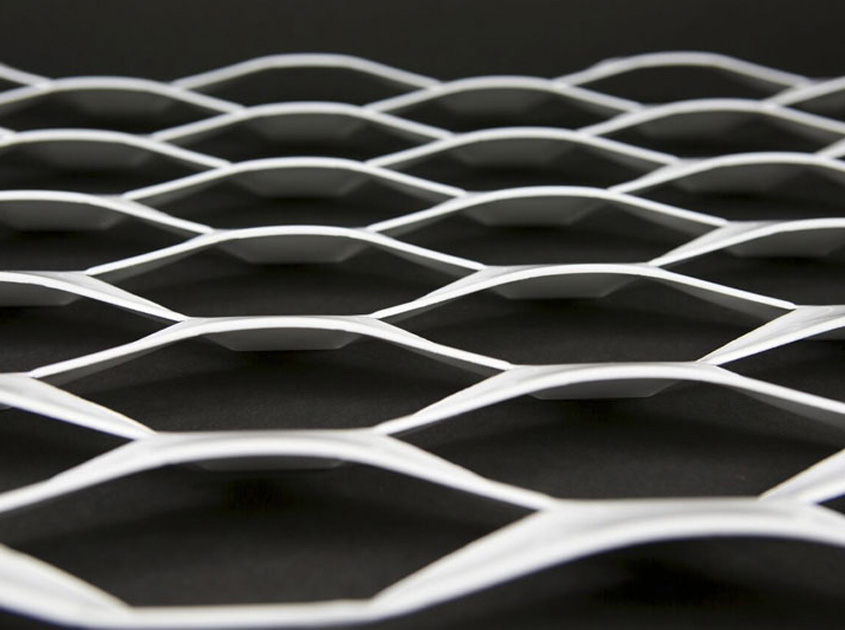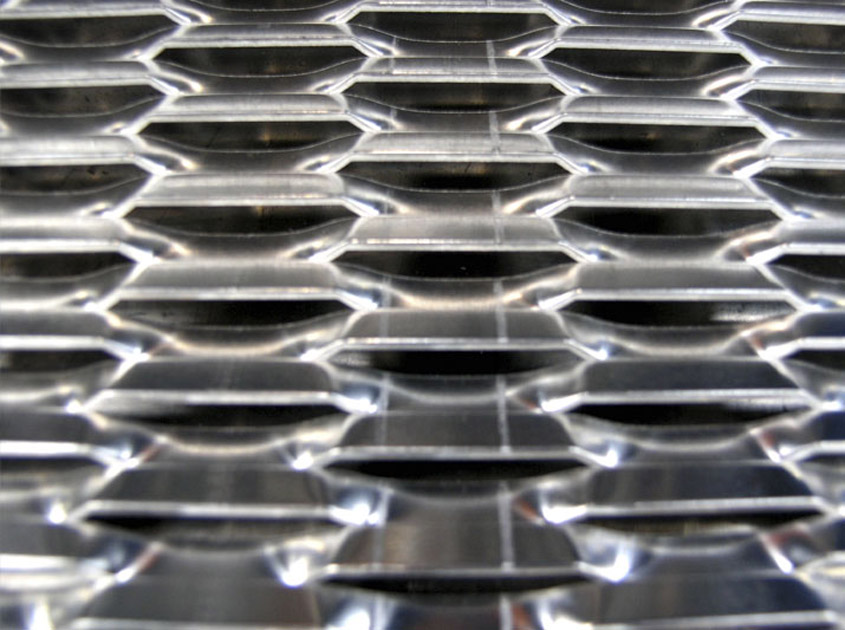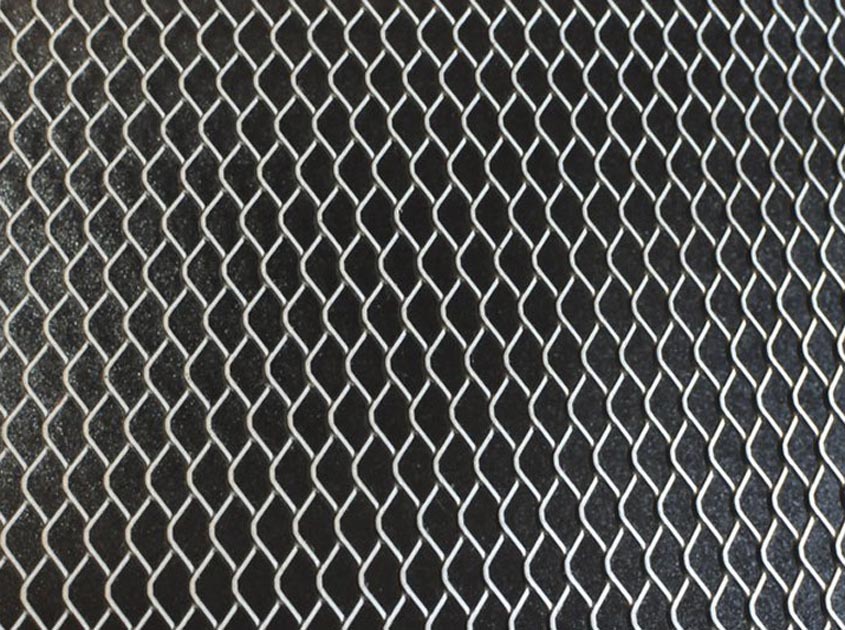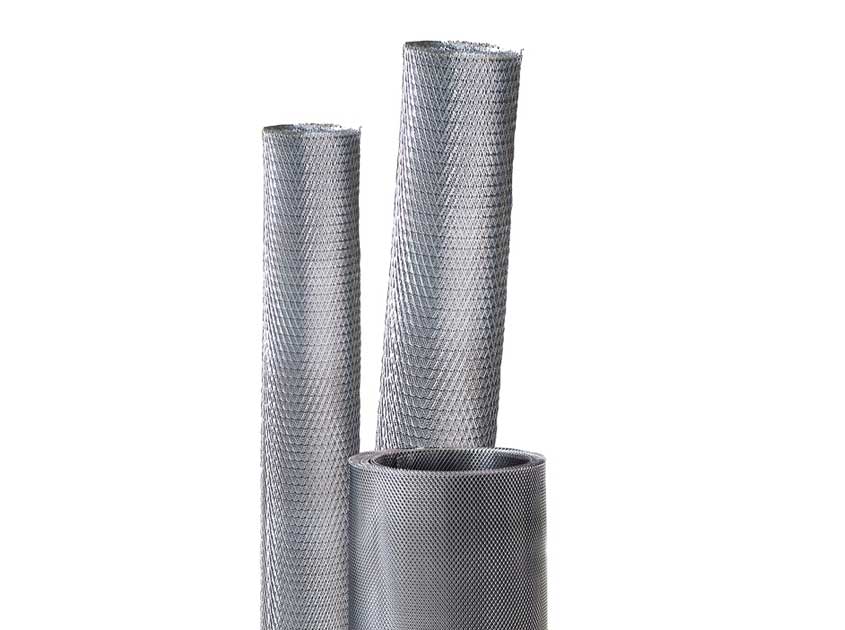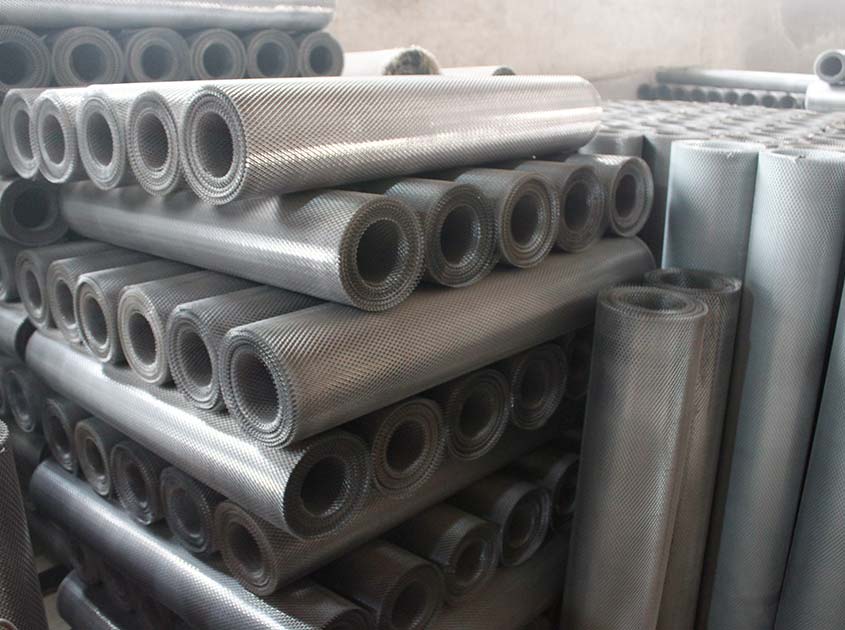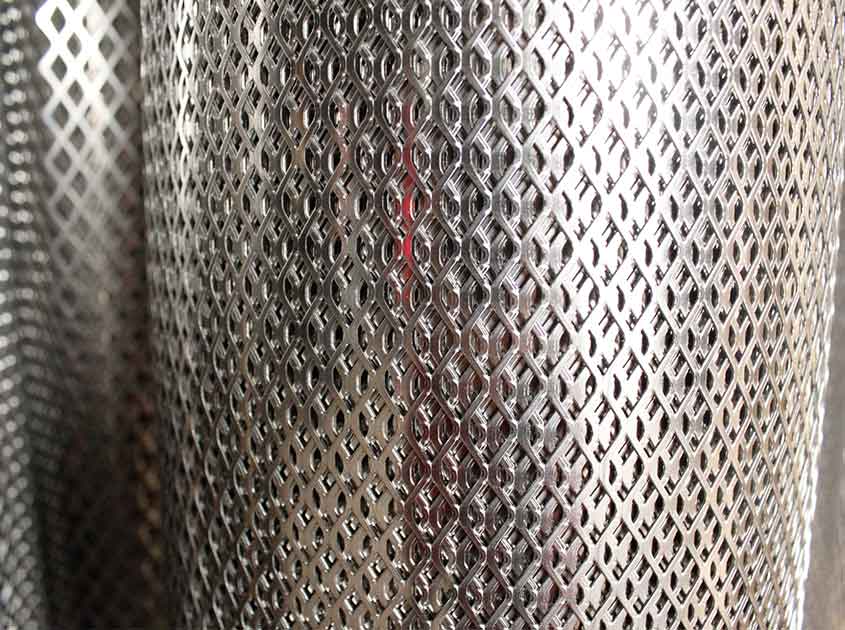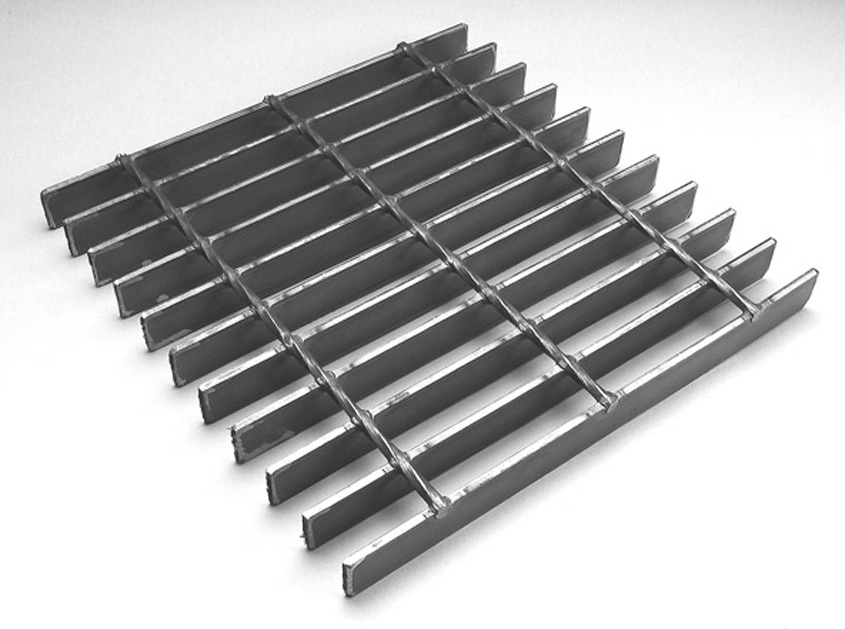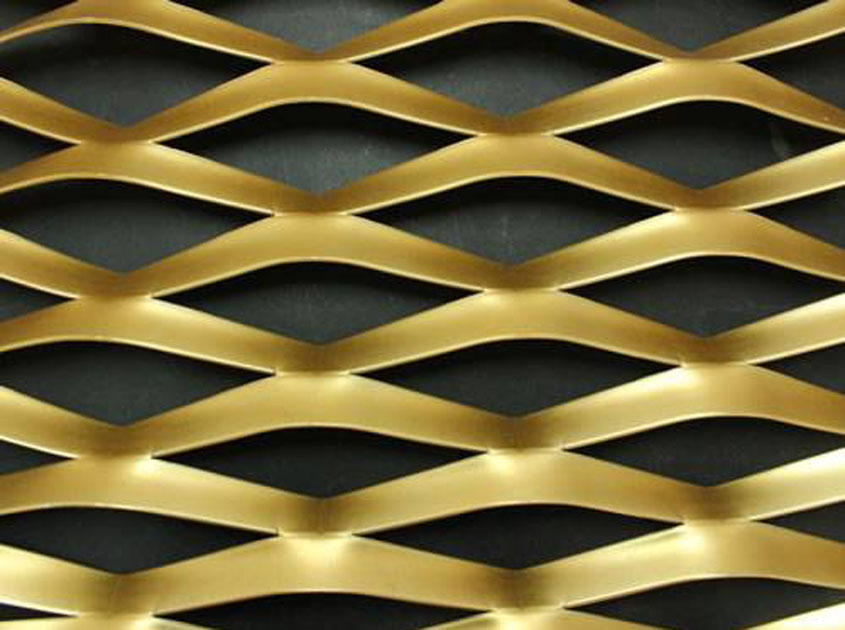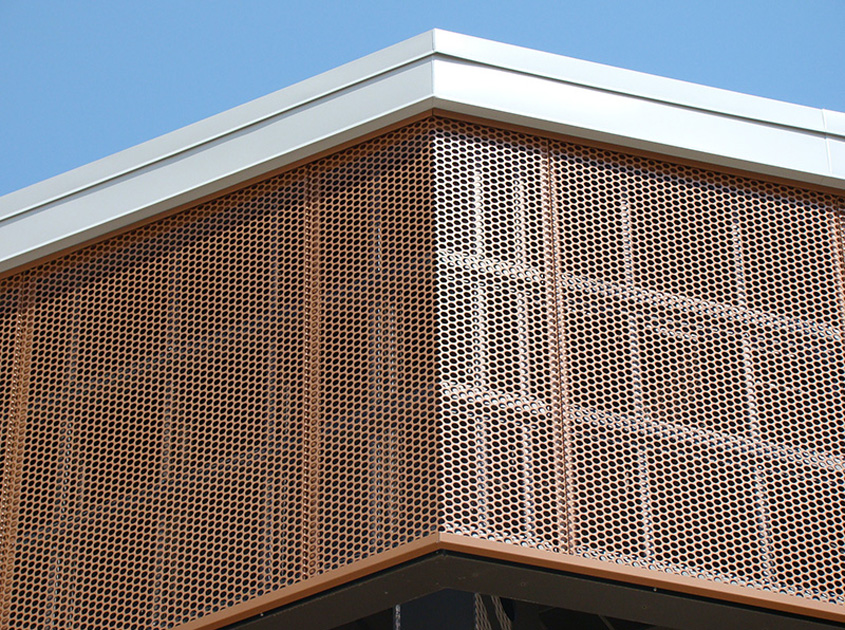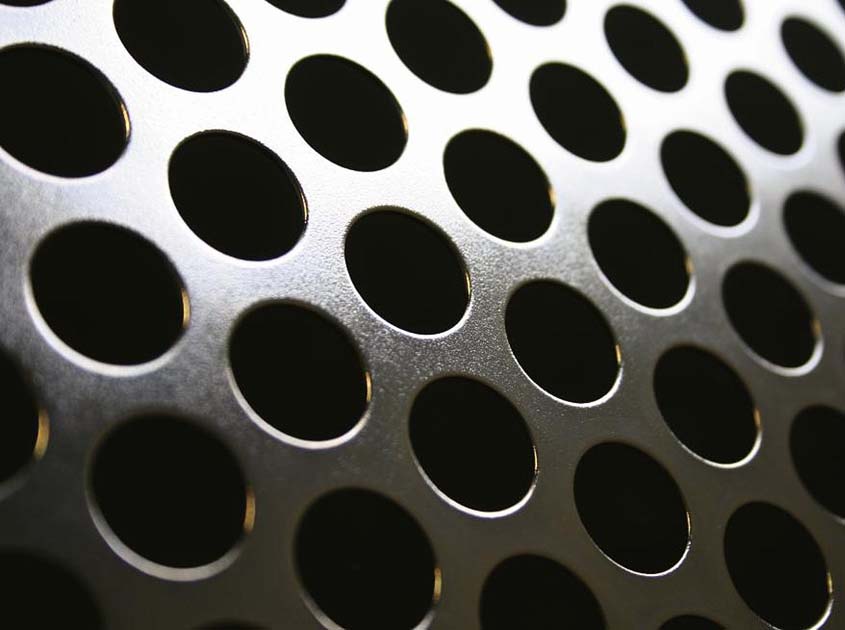Introducción:
La malla metálica expandida tiene una amplia gama de usos, formas elegantes y una gran capacidad de procesamiento. Una de las principales ventajas del expandido es que la malla se forma a partir de una sola pieza de material y el proceso no genera desperdicio y, por lo tanto, es rentable.
Uso principal de la malla metálica expandida: el tratamiento de la superficie del metal y el procesamiento posterior, se utilizan ampliamente en grandes lugares, tanto en interiores como en exteriores, decoración, aeroespacial, petróleo, industria química, metalurgia, medicina, fabricación de papel, filtración, cría, embalaje, instalaciones mecánicas, protección. , fabricación de artesanías, rejilla de altavoz de alta calidad, asiento para niños, canastas, canastilla, protección de carreteras y maquinaria pesada, calderas, minas de petróleo, locomotoras, barco de vapor tonner, plataforma de trabajo, escalera, pasarela. También se puede usar para construcción, carreteras y puentes como uso reforzado.
La diferencia entre el metal expandido común y el metal expandido aplanado.
Metal expandido común: este metal expandido se fabrica mediante estampado y estiramiento a máquina. No ha sido procesado. La hebra de metal y la unión y el plano tienen un cierto punto de vista, esta estructura aumenta la resistencia y la dureza del metal, la permeabilidad y tiene un buen rendimiento antideslizante y reforzado Metal expandido aplanado: el metal expandido aplanado está hecho de metal expandido común por máquina rodando plana. Después de que una hebra de metal expandido y aplanado y la unión estén en el mismo plano horizontal, el metal expandido aplanado es suave y brillante; y aplanar la harina de grosor para que sea más delgada, el ancho de la hebra más ancha, la malla más grande que la anterior. El metal expandido generalmente aplanado se aplica a menudo al desgaste y la malla con los requisitos de la situación.
Acabado de metal expandido:
1 、 Limpieza
El metal expandido se aceita fácilmente durante el proceso de fabricación y debe limpiarse antes del acabado. El método de limpieza más común es usar un solvente no corrosivo para enjuagar, limpiar.
2 、 Galvanizado
Es una forma de acabado popular y común. Galvanizado se divide en galvanizado en caliente y galvanizado en frío, que se usa más comúnmente como un enfoque de capa protectora. Eso hace que la resistencia a la corrosión del metal expandido y la resistencia al óxido sean hermosas.
3 、 oxidación
Este tratamiento de superficie se utiliza ampliamente en malla de alambre decorativa de aluminio, variedad de colores, de acuerdo con la aplicación práctica y las necesidades del cliente para elegir. Malla oxidada lisa, brillante.
4 、 Pintura, revestida
Después de pintar y recubrir, el metal expandido tiene un buen rendimiento anticorrosión, ligero y suave, y también para evitar rebabas en los bordes o en los agujeros.
Caracteristicas:
Resistencia a la corrosión,
Durable
Fácil de montar,
De aspecto hermoso
Antideslizante
Resistencia al desgaste
Fuerte resistencia a la tracción con menos peso
Especificaciones:
| Carbon Steel-Standard | ||||||||
| Specification | Design Size | Opening Strands | Size of Strands | Overall Thickness | Open Area | |||
| (Inches) | (Inches) | (Inches) | (Inches) | (%) | ||||
| SWD | LWD | SWO | LWO | Width | Thickness | |||
| 1/4" #20 | 0.25 | 1 | 0.125 | 0.718 | 0.072 | 0.036 | 0.135 | 45 |
| 1/4" #18 | 0.25 | 1 | 0.11 | 0.718 | 0.072 | 0.048 | 0.147 | 43 |
| 1/2" #20 | 0.5 | 1.2 | 0.438 | 0.938 | 0.072 | 0.036 | 0.14 | 80 |
| 1/2" #18 | 0.5 | 1.2 | 0.438 | 0.938 | 0.088 | 0.048 | 0.172 | 72 |
| 1/2" #16 | 0.5 | 1.2 | 0.375 | 0.938 | 0.087 | 0.06 | 0.175 | 65 |
| 1/2" #13 | 0.5 | 1.2 | 0.312 | 0.938 | 0.096 | 0.092 | 0.204 | 57 |
| 3/4" #16 | 0.923 | 2 | 0.813 | 1.75 | 0.101 | 0.06 | 0.21 | 78 |
| 3/4" #13 | 0.923 | 2 | 0.75 | 1.688 | 0.096 | 0.092 | 0.205 | 76 |
| 3/4" #10 | 0.923 | 2 | 0.75 | 1.625 | 0.144 | 0.092 | 0.29 | 72 |
| (13ga) | ||||||||
| 3/4" #9 | 0.923 | 2 | 0.688 | 1.562 | 0.15 | 0.134 | 0.312 | 68 |
| (10ga) | ||||||||
| 1" #16 | 1 | 2.4 | 0.938 | 2.062 | 0.087 | 0.06 | 0.192 | 82 |
| 1-1/2"#18 | 1.33 | 3 | 1.313 | 2.625 | 0.068 | 0.048 | 0.14 | 90 |
| 1-1/2"#16 | 1.33 | 3 | 1.25 | 2.625 | 0.108 | 0.06 | 0.23 | 85 |
| 1-1/2"#13 | 1.33 | 3 | 1.188 | 2.5 | 0.105 | 0.092 | 0.202 | 85 |
| 1-1/2"#10 | 1.33 | 3 | 1.188 | 2.5 | 0.138 | 0.092 | 0.284 | 80 |
| (13ga) | ||||||||
| 1-1/2"#9 | 1.33 | 3 | 1.125 | 2.375 | 0.144 | 0.134 | 0.312 | 76 |
| (10ga) | ||||||||
| 1-1/2"#6 | 1.33 | 3 | 1 | 2.313 | 0.203 | 0.198 | 0.433 | 69 |
| (6ga) | ||||||||
| 2"#10 | 1.85 | 4 | 1.625 | 3.438 | 0.164 | 0.092 | 0.327 | 82 |
| (13ga) | ||||||||
| Stainless Steel-Standard | ||||||||
| Specification | Design Size | Opening Strands | Size of Strands | Overall Thickness | Open Area | |||
| (Inches) | (Inches) | (Inches) | Inches) | (%) | ||||
| SWD | LWD | SWO | LWO | Width | Thickness | |||
| 1/4" #18 | 0.25 | 1 | 0.12 | 0.62 | 0.087 | 0.05 | 0.15 | 30 |
| 1/2" #18 | 0.5 | 1.2 | 0.437 | 0.937 | 0.087 | 0.05 | 0.164 | 70 |
| 1/2" #16 | 0.5 | 1.2 | 0.437 | 0.937 | 0.087 | 0.062 | 0.164 | 70 |
| 1/2" #13 | 0.5 | 1.2 | 0.325 | 0.875 | 0.119 | 0.093 | 0.225 | 70 |
| 3/4" #18 | 0.923 | 2 | 0.812 | 1.75 | 0.106 | 0.05 | 0.2 | 85 |
| 3/4" #16 | 0.923 | 2 | 0.812 | 1.75 | 0.106 | 0.062 | 0.202 | 83 |
| 3/4" #13 | 0.923 | 2 | 0.75 | 1.687 | 0.107 | 0.093 | 0.202 | 80 |
| 3/4" #9 | 0.923 | 2 | 0.687 | 1.562 | 0.152 | 0.16 | 0.14 | 67 |
| (10ga) | ||||||||
| 1-1/2" | 1.333 | 3 | 1.25 | 2.75 | 0.115 | 0.062 | 0.222 | 85 |
| #16 | ||||||||
| 1-1/2" | 1.33 | 3 | 1.25 | 2.625 | 0.115 | 0.093 | 0.222 | 83 |
| #13 | ||||||||
| 1-1/2"#9 | 1.333 | 3 | 1.125 | 2.5 | 0.144 | 0.134 | 0.312 | 76 |
| (10ga) | ||||||||
| Aluminum-Standard | ||||||||
| Specification | Design Size | Opening Strands | Size of Strands | Overall Thickness | Open Area | |||
| (Inches) | (Inches) | (Inches) | (Inches) | (%) | ||||
| 1/2" .051 | 0.5 | 1.2 | 0.375 | 0.937 | 0.093 | 0.051 | 0.158 | 65 |
| 1/2" .081 | 0.5 | 1.2 | 0.375 | 0.937 | 0.093 | 0.081 | 0.186 | 60 |
| 3/4" .051 | 0.923 | 2 | 0.813 | 1.175 | 0.109 | 0.051 | 0.2 | 78 |
| 3/4".081 | 0.923 | 2 | 0.75 | 1.68 | 0.129 | 0.081 | 0.22 | 76 |
| (Lt.) | ||||||||
| 3/4".081 | 0.923 | 2 | 0.75 | 1.68 | 0.165 | 0.081 | 0.3 | 69 |
| (Lt.) | ||||||||
| 3/4".125 | 0.923 | 2 | 0.688 | 1.68 | 0.169 | 0.125 | 0.305 | 68 |
| 1-1/2".081 | 1.333 | 3 | 1.188 | 2.5 | 0.128 | 0.081 | 0.24 | 85 |
| 1-1/2".125 | 1.333 | 3 | 1.188 | 2.5 | 0.162 | 0.125 | 0.3 | 79 |
Nota: Se pueden realizar tamaños y especificaciones especiales de acuerdo con los requisitos del cliente.
Tecnología:
| Material:stainless steel, carbon steel, brass , aluminum , titanium , nickel , Al-Mg alloy | 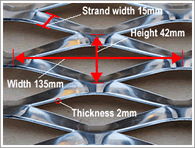  |
| Strand and Bond | |
| Expanded metal is composed of strands and bonds. Strands form the sides of the expanded metal openings. Bonds are where the strands intersect. In other words, the bond is where each diamond shaped opening is connected with the next opening. |  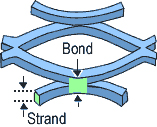 |
| SWD | |
| SWD (Short Way of the Diamond) is the distance from the middle of the bond on one side to the middle of the bond on the opposite side. |  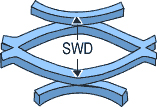 |
| LWD | |
| LWD (Long Way of the Diamond) is the distance across the largest dimension of the diamond measured halfway between the diamonds. |  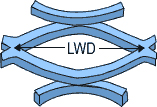 |
| SWO | |
| SWO (Short Way of the Opening) is the width of the opening of the shortest side of the diamond. SWO does not include the strand width, where SWD (Short Way of the Diamond) does. |  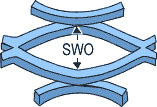 |
| LWO | |
| LWO (Long Way of the Opening) is the length of the opening of the longest side of the diamond. LWO does not include the strand width, where LWD (Long Way of the Diamond) does. |  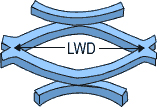 |
| Open Area | |
| Expanded metal contains open spaces (the diamond-shaped openings) and material. Open area is the total area of the diamond openings divided by the total area of the sheet or roll of expanded metal and is expressed as a percent. In other words, open area describes how much of the expanded metal is open space. If expanded metal has a 60 percent open area, then 60 percent of the expanded metal is open space and 40 percent is material. | |
| Gauge or Thickness | |
| Thickness is the measurement from the top surface to bottom surface of the expanded metal piece. Gauge is the most common measurement, but thickness can also be measured in fractional inches or millimeters. |   |
| Width and Length | |
| Length is the measure of the longest side of the expanded metal sheet or cut-to-size piece. Width is the measure of the shortest side of the sheet or cut-to-size piece. |  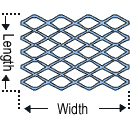 |
| Determining SWD, LWD Direction | |
| The illustration to the right shows the correct way to designate SWD and LWD dimensions in relation to the length or width. | |
Stock sheets are like the one shown above LWD Direction Parallel to Length |
LWD Direction Parallel to Width |
Nombre del Producto: Malla metálica expandida




